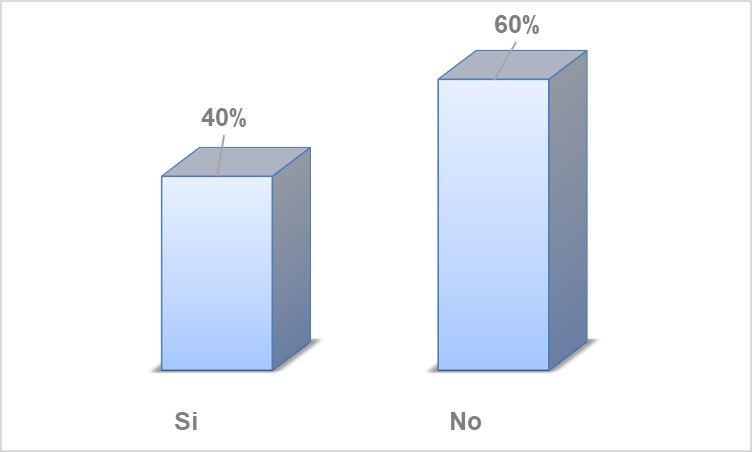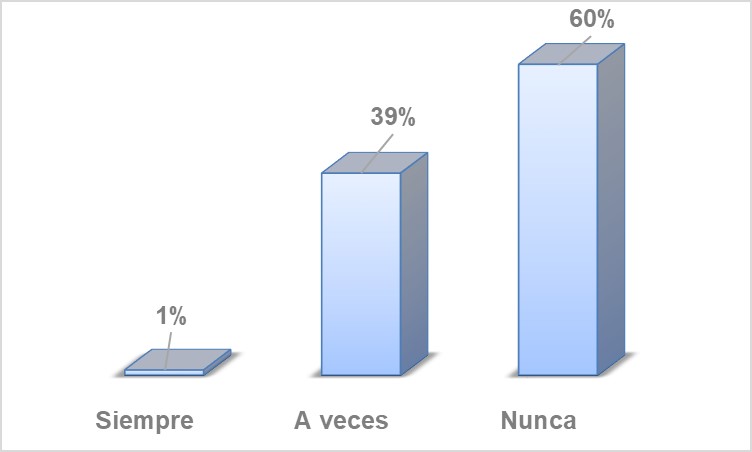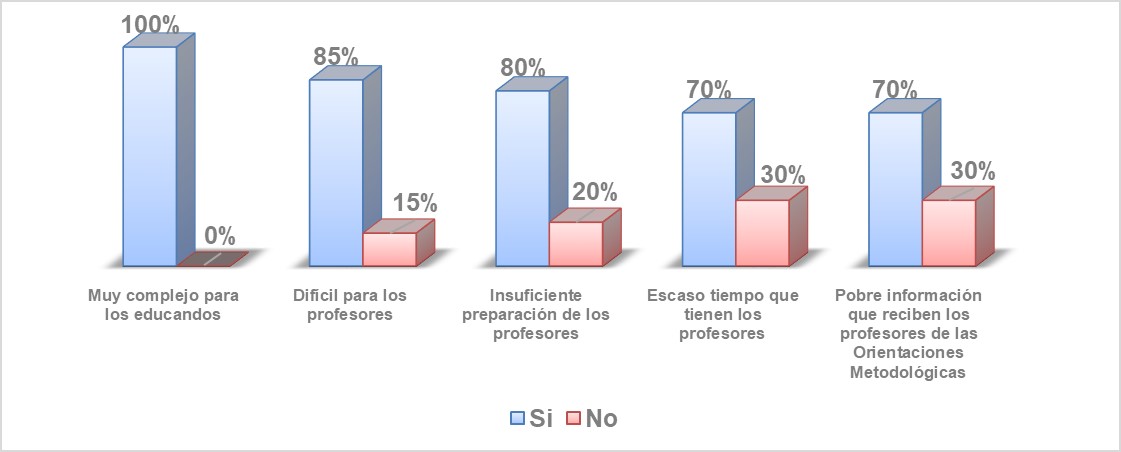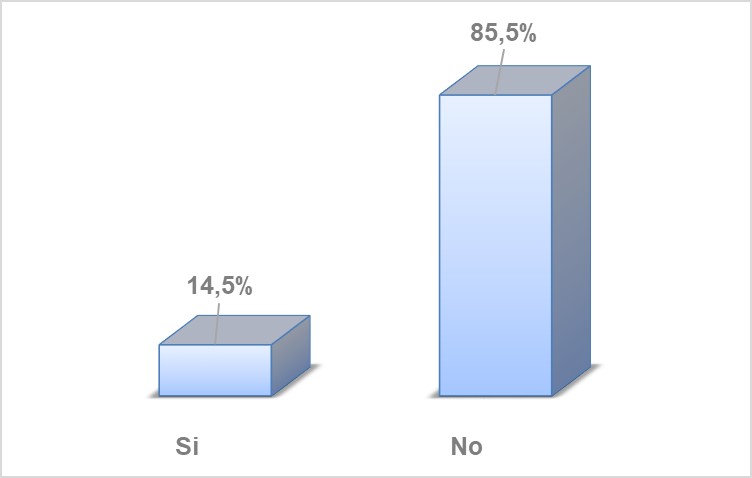
Mendive. Journal on Education, 21(3), e3243 
Translated from the original in Spanish
Original article
The problematic methods in the subject animal biology for students with visual disabilities
Los métodos problémicos en la asignatura biología animal para educandos con discapacidad visual
Os métodos problemáticos na disciplina de biologia animal para alunos com deficiência visual
Nayrelis González Herrera1 ![]() https://orcid.org/0000-0003-4331-8935
https://orcid.org/0000-0003-4331-8935
Roilán Ramírez Alí2![]() https://orcid.org/0000-0002-6217-9005
https://orcid.org/0000-0002-6217-9005
Naisvel González Herrera3![]() https://orcid.org/0000-0001-5114-7609
https://orcid.org/0000-0001-5114-7609
1 "Enrique José Varona" University of Pedagogical Sciences, Department of Special
Education. Havana Cuba. ![]() nayrelisgh@gmail.com
nayrelisgh@gmail.com
2 Special school for blind and low vision children Abel Santamaría Cuadrado. Havana.
Cuba ![]() roilanrali@gmail.com
roilanrali@gmail.com
3 University of Havana. Cuba
![]() naisvel86@gmail.com
naisvel86@gmail.com
| González Herrera, N., Ramírez Alí, R., & González Herrera, N. (2023). The problematic methods in the subject animal biology for students with visual disabilities. Mendive. Revista de Educación, 21(3), e3243. https://mendive.upr.edu.cu/index.php/MendiveUPR/article/view/3243 |
Received: November 3, 2022.
Accepted: May 22, 2023.
ABSTRACT
Productive learning based on problematic methods in the Animal Biology subject is a necessity to enhance the training and development of the personality of students with visual disabilities. The objective was to characterize the teaching-learning process in the 8th grade Animal Biology subject for students with visual disabilities at the "Abel Santamaría Cuadrado" Special School. Three dimensions of analysis were used: teachers' knowledge about problematic teaching and problematic methods, as well as the skills acquired by students in said subject. The methods used were: observation, interview and initial pedagogical test. The main results pointed to a limited theoretical knowledge of educators about the problematic methods, the categories of problematic teaching and their favorable influence on the cognitive independence of students, especially those with special educational needs due to their visual disability. Therefore, these methods are not incorporated into daily teaching practice. Conclusions: The lack of knowledge of the problematic methods by the majority of educators is a multi-causal problem, where the following stand out: methodological orientations distanced from this subject, little interest from the department, little individual preparation of the teacher and, consequently, inadequate teaching-learning process. of students with visual impairment.
Keywords: teaching-learning; biology; visual disability; learners; training; problematic methods.
RESUMEN
El aprendizaje productivo basado en los métodos problémicos en la asignatura Biología Animal, constituye una necesidad para potenciar la formación y el desarrollo de la personalidad de los educandos con discapacidad visual. El objetivo fue caracterizar el proceso de enseñanza- aprendizaje en la asignatura Biología Animal, de 8vo grado, para educandos con discapacidad visual de la Escuela Especial "Abel Santamaría Cuadrado". Se emplearon tres dimensiones de análisis: conocimientos de los profesores sobre la enseñanza problémica y los métodos problémicos, así como las habilidades adquiridas por los educandos en dicha asignatura. Los métodos que se utilizaron fueron: la observación, la entrevista y la prueba pedagógica inicial. Los principales resultados apuntaron a un limitado conocimiento teórico de los educadores sobre los métodos problémicos, las categorías de la enseñanza problémica y su influencia favorable en la independencia cognoscitiva de los estudiantes, en especial, los que poseen necesidades educativas especiales dada su discapacidad visual. Por ello, esos métodos no están incorporados a la práctica docente cotidiana. Conclusiones: El desconocimiento de los métodos problémicos por la mayoría de los educadores es un problema multicausal, donde destacan: orientaciones metodológicas distanciadas de esta temática, poco interés del departamento, escasa preparación individual del maestro y, por consiguiente, inadecuado proceso de enseñanza-aprendizaje de los educandos con discapacidad visual.
Palabras claves: enseñanza-aprendizaje; biología; discapacidad visual; educandos; formación; métodos problémicos.
RESUMO
A aprendizagem produtiva baseada em métodos problematizadores na disciplina de Biologia Animal é uma necessidade para potencializar a formação e o desenvolvimento da personalidade de alunos com deficiência visual. O objetivo foi caracterizar o processo de ensino-aprendizagem na disciplina de Biologia Animal do 8º ano para alunos com deficiência visual da Escola Especial "Abel Santamaría Cuadrado". Foram utilizadas três dimensões de análise: o conhecimento dos professores sobre o ensino problemático e os métodos problemáticos, bem como as competências adquiridas pelos alunos na referida disciplina. Os métodos utilizados foram: observação, entrevista e teste pedagógico inicial. Os principais resultados apontaram para um conhecimento teórico limitado dos educadores sobre os métodos problemáticos, as categorias de ensino problemático e sua influência favorável na independência cognitiva dos alunos, principalmente aqueles com necessidades educacionais especiais devido à sua deficiência visual. Portanto, esses métodos não são incorporados à prática pedagógica diária. Conclusões: O desconhecimento dos métodos problemáticos por parte da maioria dos educadores é um problema multicausal, onde se destacam: orientações metodológicas distanciadas desta disciplina, pouco interesse do departamento, pouca preparação individual do professor e, consequentemente, processo de ensino-aprendizagem inadequado de alunos com deficiência visual.
Palavras-chave: ensino-aprendizagem; biologia; deficiência visual; alunos; treinamento; métodos problemáticos.
INTRODUCTION
The development achieved by the pedagogical sciences in the international arena requires in contemporary Cuban society an education that constantly evolves to match the level of advances of the time. In the opinion of Páez (2018), pedagogy and didactics face problems of an epistemological nature that are insufficiently updated or contextualized to the Cuban reality, which impacts and affects the comprehensive training of the pedagogical training professional. Within the categories to be studied are the contents, related to the necessary management of knowledge in the interaction with the practice that is being investigated.
As Páez (2018) points out, different authors state that problematic methods have become a problem that is particular to the 21st century and make proposals on problem-based learning. This is a pedagogical option with significant precedents in the Cuban and international reality, which allows an approach to the essential aspects of knowledge management, its impact on the professional training process and its impact on the sustainable development of Cuban society.
Problem-based learning is based on problematic methods that allow the teacher and the student to use different learning strategies. Gargallo et al. (2018) consider that it is not easy to move from an approach centered on teaching to one centered on learning, as its extension requires cooperative work between teachers, integrated curricular designs, as well as commitments from students and teachers. In this regard, Maldonado et al. (2019) comment:
It is important to mention that the student's learning strategies are defined in relation to decision making. He chooses and activates the knowledge he needs to respond to the demands of professional and personal demand, depending on the conditions of the educational situation. (p.416)
Offering students, the mechanisms that allow them to learn by themselves, so that they are able to correctly solve the problems that arise during their educational and social activity is the objective of the teaching-learning process. The student must discover for himself the essential characteristics of the phenomenon, the regularities, the links with others and its creative application.
The use of problematic teaching is an issue to which the Ministry of Education (MINED) of the Republic of Cuba pays special attention. Rodríguez and Arias (2022) consider that analyzing what other teaching methods and strategies linked to the teaching of sciences are related to a greater or lesser extent with the academic performance of the student, provides the different educational administrations with information on how they can improve the decision making. decisions to organize and plan educational science curricula, from an empirical perspective and adjusted to the context of application.
Basulto (2017) comments that the MINED proposes that, from the discipline of Biology, there be a greater use of educational potential in the current improvement of pedagogical guidelines:
In the area of Natural Sciences, specifically in Biology, it is important to promote productive learning. Thus, the use of problematic methods promotes productive thinking, determined by the ability of students to appropriate the new, the unknown, which implies achieving learning based on problem solving. (p.76)
In this sense, Méndez (2019) states that the study of Biology from the biological foundations of education is as important as the philosophical, psychological or sociological ones. Therefore, the biological foundations of education should be discussed with the same frequency and depth, since they coherently explain the support that underlies the living and knowing essence of the subjects. It is the trait that distinguishes the human being as a bio-psycho-social subject and makes its educability possible.
Consistent with the above, Salcedo et al. (2002) consider that in the Biology subject, the contents must demonstrate biological integrity, structure-property-function-operation and science-technology-society-health relationships; based on explanatory-integrative, evolutionary, ecosystemic and bioethical approaches to sustainable development.
Similarly, Ferrer et al. (2014) believe that, despite the importance of the topic in question, little use is still made in the classes of methods that require the productive cognitive activity of the students and, in the cases in which it occurs, the necessary follow-up. On many occasions, teachers concentrate on the considerable volume of the contents they deal with, without making a correct dosage, which leads to great limitations in the cognitive independence of the student.
The transformations in the Cuban Educational System promote that the design of objectives, contents, methods and the organization of education and teaching, promote a less reproductive and rote learning and more productive. Since the 1977-1978 school year, these changes are evident in the Special Education improvement plan (Navarro et al., 2021); translated into radical changes in study plans, programs and methodological orientations.
The search for new ways to raise the quality of Special Education means the elimination of the dogmatic and reproductive teaching used until the last century. This mechanical teaching contemplates the simple repetition of definitions, without there being an understanding and production by the students. (Ferrer et al., 2014, p. 6)
Special education has to train teachers according to the historical-cultural demand. At this time, educational inclusion demands personalized educational attention.
The training plans that propose recent more progressive offers, given the impossibility of assuming everything that is reflected in such complexity, have chosen to cut their own space for action, trying to launch a curriculum consistent with their principles and approaches, their coincidence with inclusive education and educational attention to diversity to train future teachers of Special Education. What has generated collaborative work, perhaps without precedent, in the curricular design for professional training. (Meléndez, 2020, p. 327)
Within Special Education is comprehensive education for students with visual disabilities -a term that includes students with strabismus, amblyopia, low vision or blind-, who must be provided with an education according to their needs. Comprehensive and inclusive teaching to these students must pay special attention to cognitive processes and areas of development that require correction and compensation, among which learning is a fundamental piece. It is worth noting that in the research the sample was made up only of blind 8th grade students from the "Abel Santamaría Cuadrado" special school.
The blind student needs to be given the necessary motivation so that learning is enriching. Encourage them to search for conscious learning, where they self-manage their knowledge by demonstrating mastery of somatosensory exploration techniques, by understanding each response that their organism gives to stimuli inherent to touch, pressure, vibration, thermal information, pain, and information about movements and relative position of different body parts. (González and Hernández, 2020, p. 40)
In coherence with the above, Oliveira (2019) considers that teaching for blind students does not have many innovative methodological suggestions. It is necessary to promote teacher training with practices that are welcoming to these differences. The teacher must be in constant preparation in order to adequately satisfy the complex demands present in schools.
Thus, Curmen (2019) states that blind people tend to be relegated in many areas, especially in the academic and professional spheres, due to the scarce teacher training, the lack of adequacy of the educational contents, the curriculum, the evaluation system and the the learning spaces. Prejudices of certain social groups or the indifference and irrelevance exerted on those who have different sensory conditions are also influential, obstacles that this community constantly overcomes. In this sense, Méndez and Carvajal (2019) opine:
From a comprehensive perspective, the special importance of the role of the teacher in the guide, orientation to a specific and organized purpose conscious of said process in the school setting is recognized, (...) by serving as a mediator between the student and the environment (natural and social), spontaneously and in any field. (p.156)
Precisely, the exploration in practice through observations, study of documents and the exchange with specialists, allow to identify the little use of the problematic methods in the teaching-learning process of Biology; the lack on many occasions of teaching aids and didactic resources suitable for working with students with visual disabilities; as well as the difficulties of these students to assimilate the contents received. This limits the mastery of the basic concepts, the analysis and interpretation of the problems and the specific methodological orientations for the teaching-learning process of this subject.
Taking into account the proposed theme, the objective is to: Characterize the teaching-learning process in the Animal Biology subject in students with visual disabilities of the "Abel Santamaría Cuadrado" Special School.
MATERIALS AND METHODS
The article comments on the results obtained in the characterization of the teaching-learning process in the 8th grade Animal Biology subject for students with visual disabilities at the "Abel Santamaría Cuadrado" Special School. This institution is the only one of its kind in Havana. As a provincial school, it also functions as a resource and support center, guiding and preparing teachers and educational centers that include students with visual disabilities.
The research explored three dimensions of analysis: 1. Knowledge of teachers about the theoretical elements of problematic teaching, 2. Knowledge of teachers about problematic methods in the teaching-learning process of Animal Biology and 3. Skills acquired by students in that subject.
The following study methods were used: the interview with 23 teachers, the observation of 10 classes of the Animal Biology subject, unit "Coelomed non-chordated animals" and the initial pedagogical test on 7 visually impaired students. The triangulation of these results made it possible to verify the state of preparation that the teachers had to apply the problematic teaching in the contents of the Animal Biology subject for students with visual disabilities.
In all the techniques and methods applied at the different moments of the research, the procedures followed were subject to the ethical standards of the scientific and ethical committee of the "Enrique José Varona" University of Pedagogical Sciences, the institution that supervised the study.
As limitations of the research, deficient access to Cuban bibliography is pointed out -due to the non-existence of a repository that allows easy access to the scientific production of universities and other academic centers- and foreign ones due to difficulties in connection and difficulties in carrying out purchases or payments online.
RESULTS
Regarding the results obtained, it was significant that 100% of the teachers interviewed initially reported having knowledge about the methods that promote cognitive independence. However, when asked to mention some of the methods, only 20% of the teachers could name some of them. The generality of the answers given were the following:
When delving into the real mastery of teachers about the methods that promote cognitive independence, most commented that they were not aware of the categories of problematic teaching, as shown in figure 1. The various answers obtained in this question were grouped together. in the following four aspects:

Fig. 1- Knowledge that the teachers of students with visual disabilities of the Special School "Abel Santamaría Cuadrado" have about the categories of problematic teaching
Consistent with the results discussed up to now, the use of the problematic methods in classes was negligible. As figure 2 shows, most teachers never apply them and almost the rest incorporate it only occasionally. Specifically, only one teacher commented that he used the problematic teaching in the unit "Coelomed non-chordate animals" of the Biology 2 program. When enunciating the types of methods used in classes, the majority of the interviewees referred inappropriately to:

Fig. 2- Use by teachers of problematic methods in classes with students with visual disabilities at the "Abel Santamaría Cuadrado" Special School
Figure 3 represents the significant prevalence of the aspects that negatively affect the application of the problematic teaching in the five explored indicators; those that are closely related to each other and show that all parts of the teaching-learning process must act systemically: educators, students and methodologists.

Fig. 3- Aspects that negatively affect the application of the problematic teaching according to the teachers of students with visual disabilities of the Special School "Abel Santamaría Cuadrado"
In general, as figure 4 illustrates, problematic teaching was not a topic of relevance for the Department, nor was it a topic that mobilized teachers; which is consistent with the previously mentioned data. The teachers stated that the activities carried out in the Department related to the approach to aspects related to problematic teaching focused only on highlighting the importance of the subject, requiring methodological preparation on the methods that promote cognitive independence, the categories of teaching problematic and problematic methods.

Fig. 4- Approach in the Department of aspects related to problematic teaching according to teachers of students with visual disabilities of the "Abel Santamaría Cuadrado" Special School.
On the other hand, the observations made to classes showed that:
Based on the information obtained in the initial pedagogical test, the following elements were diagnosed:
DISCUSSION
Most teachers do not know which are the problematic methods or that activate thought, nor do they have mastery of the categories of problematic teaching, its contents and methodologies. Only the problematic situation and the problematic questions emerged correctly, ignoring the rest of the concepts that make up the categorical system in question: teaching problem, problematic tasks and the problematic. At the same time, it was found that they confused the problematic situation with the problematic methods, using universal arguments for their definition without addressing the specificities of each one.
Regarding the factors that have had an unfavorable impact on the application of problematic teaching, it was appreciated that teachers perceive it as very complex and difficult, both for students and for teachers. This result is consistent with the scant preparation they receive through the methodological orientations, the Department's praxis and the scant theoretical, methodological and practical mastery they have on the subject in question. This deficient preparation, therefore, has a markedly unfavorable impact on the quality of the classes, on the motivation of students with visual disabilities and on the effectiveness of their learning.
In general, the analysis of the teaching-learning process of the study of the "Coelomed non-chordate animals" unit of the Animal Biology subject for students with visual disabilities, revealed difficulties related to methodological problems in its direction and planning. The teachers made an excessive use of reproductive methods and procedures, which determined that the class responded to a traditional and reproductive approach. This entails the passive performance of students in class and the demand for active actions of thought, such as reflection, problem solving and cognitive independence.
It is important to mention that in the bibliography consulted on the subject, no studies directly related to the subject were found. Articles related to the teaching and learning of Biology in sighted people were found, as well as methodological alternatives for teaching blind students. The teaching of Biology in students with visual disabilities and specifically through the problematic methods, is a subject with few references. Therefore, the contrast of the results of this study with those obtained in others available in the literature consulted at this time is limited. As part of the professional and investigative development, the search for valid references for future studies continues.
By way of conclusion, it is important to point out that there are serious deficiencies in teachers for the development of a non-traditional education. This situation needs to be reversed through coherent work among the actors involved, such as methodological guidelines -at the macro-social level-; the preparation of constant improvement that the School and the Department must carry out at the mesosocial level- and the interest of the teachers in their professional development, in raising the quality of their practice in line with the contemporary proposals of the pedagogical sciences at the microsocial level.
It is considered that the characterization of the teaching-learning process in the Animal Biology subject in students with visual disabilities of the "Abel Santamaría Cuadrado" Special School, through the use of different methods, has allowed to specify the real needs of teachers for improvement, the different factors that affect the quality of the methodological preparation they receive; as well as the negative impact they have on students. This diagnosis constitutes the first step to draw up specific and correct transformation strategies that fully involve all the parties involved.
BIBLIOGRAPHIC REFERENCES
Basulto, G., Gómez, F. D. y González, O. (2017). Enseñar y aprender Biología dese el enfoque histórico sociocultural-profesional. EduSol, 17(61), 70-79 https://www.redalyc.org/articulo.oa?id=475753289019.
Curmen Rojas, E. A. (2019). Enseñanza del alemán a personas ciegas. Matices en Lenguas Extranjeras, (13), 15-59. DOI: https://doi.org/10.15446/male.n13.89607
Ferrer, M. T., Briña, J., Polledo, G. N., Martínez, M. L., Leyva, M. y González, D. (2014). Introducción a las especialidades de Eduación Preescolar, Primaria y Especial. Editorial Pueblo y Educación.
Gargallo, B., Sahuquillo Mateo, P. M., Verde, I. y Almerich, G. (2018). ¿Qué ocurre cuando los profesores utilizan métodos centrados en el aprendizaje? Efectos en los enfoques de aprendizaje, en las capacidades del alumno y en su percepción del entorno de aprendizaje. Revista de Educación de Valencia, (382), 163-197. https://doi.org/10.4438/rce.num1988-592
González, N. y Hernández, C. (2020). Alternativas metodológicas para docentes que atienden educandos ciegos. Horizontes Pedagógicos, 9(4), 36-47.
Maldonado, M., Aguinaga, D., Nieto, J., Fonseca, F., Shardin, L. y Cadenillas, V. (2019). Estrategias de aprendizaje para el desarrollo de la autonomía de los estudiantes de secundaria. Propósitos y Representaciones, 7(2), 415-439 http://dx.doi.org/10.20511/pyr2019.v7n2.290
Meléndez, L. (2020). Tendencias formativas en Educación Especial en Iberoamérica. Revista Colombiana de Educación, 1(79), 325-346. https://doi.org/10.17227/rce.num7910351
Méndez, I. y Carvajal, B. (2019). Una mirada a los fundamentos biológicos de la educación desde la teoría de Santiago. Transformación, 15(2), 154-169.
Navarro, S. M., Valle, A., García, S. y Juanes, I. (2021). La investigación sobre el III perfeccionamiento del sistema nacional de educación en Cuba. Apuntes. Editorial Pueblo y Educación.
Oliveira, V. L., Bessa D, M. y Gomes, E. (2019). O processo de transposicao didáctica interna no ensino de estatística para alunos ciegos. INTEREDU, 9(1), 35-54.
Páez, V. (2018, 2). La gestión del conocimiento y la labor educativa: Propuesta innovadora en la formación superior pedagógica [Ponencia]. Congreso Internacional de Educación Superior Universidad, La Habana, Cuba.
Rodríguez, A. y Arias, A. (2022). ¿El aprendizaje basado en indagación mejora el rendimiento académico del alumnado en ciencias? Análisis basado en pisa 2018. Revista Colombiana de Educación, (86), 53-74. https://doi.org/10.17227/rce.num86-12232
Salcedo, I., Hernánez, J., del Llano, M., Pherson, M. y Daudinot, I. (2002). Didáctica de la Biología. Editorial Pueblo y Educación.
Conflict of interests:
The authors declare not to have any interest conflicts.
Contribution of the authors:
The authors participated in the design and writing of the work, and analysis of the documents.
![]()
This work is licensed under a Creative Commons Attribution- NonCommercial 4.0
International License